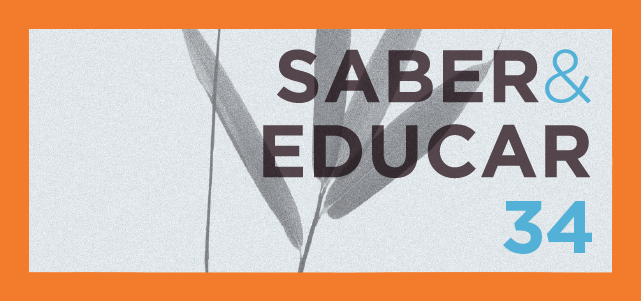Pensamento Crítico e Inteligência Relacional
Aprendizagem Cooperativa em Matemática no Ensino Secundário e Implicações para o Ensino Superior
DOI:
https://doi.org/10.25767/se.v34i1%20(Em%20Progresso).42138Palavras-chave:
Pensamento crítico, inteligência relacional, aprendizagem cooperativa, ensino secundário, ensino superior, Matemática AResumo
O desenvolvimento do pensamento crítico constitui uma prioridade na educação matemática, sendo particularmente relevante em contextos que valorizam a inteligência relacional. Este estudo quasi-experimental analisou os efeitos da aprendizagem cooperativa nas disposições para o pensamento crítico em alunos do 11.º ano de Matemática A. Participaram 119 alunos de uma escola pública do norte de Portugal, distribuídos por um grupo experimental (n = 70) e um grupo de controlo (n=49). O grupo experimental participou em atividades cooperativas estruturadas ao longo de 13 semanas, enquanto o grupo de controlo seguiu uma abordagem mais tradicional. Através da aplicação da Escala de Disposições de Pensamento Crítico (EDPC), verificaram-se melhorias estatisticamente significativas no grupo experimental, sobretudo nas disposições de mente aberta (p<.001), procura da verdade (p=.004), autoconfiança no raciocínio (p=.001) e maturidade cognitiva (p = .005), não se registando alterações significativas no grupo de controlo. Estes resultados sustentam a eficácia da aprendizagem cooperativa no desenvolvimento de competências críticas e relacionais no ensino secundário, com implicações diretas para o ensino superior, nomeadamente na formação de professores e na promoção de práticas pedagógicas inovadoras.
Referências
Akinoso, S. O., Olafare, F. O., & Oye-Akinoso, Z. B. (2021). Effect of collaborative teaching on secondary school students’ achievement in and attitude towards Mathematics. International Journal of Research and Innovation in Applied Science, 6(08), 01-05.
Arisoy, B., & Aybek, B. (2021). The Effects of Subject-Based Critical Thinking Education in Mathematics on Students' Critical Thinking Skills and Virtues. Eurasian Journal of Educational Research, 92, 99-119. https://doi.org/10.14689/ejer.2021.92.6
Cohen, L., Manion, L., & Morrison, K. (2002). Research methods in education (5th ed.). Routledge. https://doi.org/10.4324/9780203224342
Correa-Gurtubay, P., & Osses-Sánchez, N. A. (2023). Cooperative Learning: Reflections for Implementation in Inclusive Classrooms. Revista Electronica Educare, 27(1), 623-637. http://dx.doi.org/10.15359/ree. 27-1.14543
Creswell, J. W., & Plano Clark, V. L. (2018). Designing and Conducting Mixed Methods Research (3rd ed.).SAGE.
DGE (2018). Aprendizagens Essenciais. Articulação com o perfil dos alunos – 11.º Ano – Ensino Secundário – Matemática A. Direção-Geral da Educação. https://www.dge.mec.pt/aprendizagens-essenciais-ensino-secundario
Dwyer, C. P. (2017). Critical thinking. Cambridge University Press.
Ennis, R.H. (2018). Critical Thinking Across the Curriculum: A Vision. Topoi 37, 165–184. https://doi.org/10.1007/s11245-016-9401-4
Erdogan, F. (2019). Effect of cooperative learning supported by reflective thinking activities on students’ critical thinking skills. Eurasian journal of educational research, 19(80), 89-112. https://doi.org/10.14689/ejer.2019.80.5
Facione, P. A. (2011). Critical thinking: What it is and why it counts. Insight assessment, 1(1), 1-23.
Freitas, M. L., & Freitas, M. J. (2003). Aprendizagem cooperativa: Uma estratégia para o ensino superior. Revista Portuguesa de Pedagogia, 37, 105-120.
Gillies, R. M. (2016). Cooperative Learning: Review of Research and Practice. Australian Journal of Teacher Education, 41(3). https://doi.org/10.14221/ajte.2016v41n3.3
Goleman, D. (2006). The socially intelligent. Educational leadership, 64(1), 76-81.
Johnson, D. W., & Johnson, R. T. (2019). Cooperative Learning: The Power of Positive Interdependence. Journal of Educational Psychology, 111(1), 45-55.
Klang, N., Karlsson, N., Kilborn, W., Eriksson, P., & Karlberg, M. (2021). Mathematical problem-solving through cooperative learning-The importance of peer acceptance and friendships. Frontiers in Education, 6, 710296. |https://doi.org/10.3389/feduc.2021.710296
Kovács, E., Pinter Krekić, V., & Ivanović, J. (2020). Stavovi učenika o važnosti suradničkoga učenja u nastavi matematike u nižim razredima osnovne škole. Croatian Journal of Education: Hrvatski časopis za odgoj i obrazovanje, 22(2), 331-356. https://doi.org/10.15516/cje.v22i2.3286
Loes, C. N., & Pascarella, E. T. (2017). Collaborative learning and critical thinking: Testing the link. The Journal of Higher Education, 88(5), 726-753. https://doi.org/10.1080/00221546.2017.1291257
Lopes, J. P., & Silva, H. S. (2022). Aprendizagem Cooperativa na Sala de Aula: Um guia prático para o professor (2ª ed.). PACTOR.
Lopes, J., Silva, H., & Morais, E. (2021). Construção e validação de uma escala de disposições de pensamento crítico para estudantes universitários (EDPC). Revista Lusófona de Educação, 53(53), 119-138. https://doi.org/10.24140/issn.1645-7250.rle53.07
Martins, G., Gomes, C., Brocardo, J., Pedroso, J., Camilo, J., Silva, L., Encarnação, M., Horta, M., Calçada, M., Nery, R., & Rodrigues, S. (2017). Perfil dos alunos à saída da escolaridade obrigatória. https://comum.rcaap.pt/bitstream/10400.26/22377/1/perfil_dos_alunos.pdf
Morais, E., Lopes, J., Silva, H., Dominguez, C., Payan-Carreira, R., Imaginário, C., & Santos, M. J. (2023). Dispositions toward Critical Thinking in Portuguese Undergraduate Students. Educational Process: International Journal, 12(1), 19-35. https://dx.doi.org/10.22521/edupij.2023.121.2
Mulligan, D. (2021). Does lesson study influence teachers’ perceptions, understandings and actions relating to inclusive practice with regards to special educational needs in mainstream primary schools. Proceedings of the 8th conference on research in mathematics education in Ireland (MEII 8), Ireland (pp. 92-98).
Novak, J. D., & Cañas, A. J. (2008). The theory underlying concept maps and how to construct and use them. http://cmap.ihmc.us/Publications/
OECD (2023). Artificial Intelligence and the Future of Skills: Capabilities and Assessments. OECD Publishing. https://doi.org/10.1787/5ee71f34-en
Paul, R., & Elder, L. (2006). Critical thinking: The nature of critical and creative thought. Journal of developmental education, 30(2), 34.
Pujolás, P. (2012). Aulas inclusivas e aprendizagem cooperativa. In D. Rodrigues (Org.), Educação Inclusiva dos Conceitos às Práticas de Formação (2.ª ed., pp.45-88). Instituto PIAGET.
Silva, H., Lopes, J., Dominguez, C., & Morais, E. (2022). Lecture, cooperative learning and concept mapping: Any differences in critical and creative thinking development? International Journal of Instruction, 15(1), 765-780. https://doi.org/10.29333/iji.2022.15144a
Slavin, R. E. (1995). Cooperative learning: Theory, research, and practice. Allyn & Bacon.
Van Ryzin, M. J., Roseth, C. J., & McClure, H. (2020). The effects of cooperative learning on peer relations, academic support, and engagement in learning among students of color. The Journal of Educational Research, 113(4), 283-291. https://doi.org/10.1080/00220671.2020.1806016
Zorrilla, M. V., & Sione, C. (2020). Aprendizaje cooperativo y habilidades sociales. https://www.sidalc.net/search/Record/oai:ucacris:123456789-10915
Publicado
Como Citar
Edição
Secção
Licença
Direitos de Autor (c) 2025 Maria Magalhães, Helena Santos Silva, José Pinto Lopes

Este trabalho encontra-se publicado com a Licença Internacional Creative Commons Atribuição-NãoComercial-CompartilhaIgual 4.0.
Os autores mantêm os direitos de autor e concedem à Saber & Educar o direito de primeira publicação, com o trabalho simultaneamente licenciado sob a Licença Creative Commons Attribution 4.0 International (CC BY 4.0) que permite que outros partilhem, adaptem e redistribuam o trabalhopara qualquer finalidade, inclusive comercial, desde que seja dado o devido crédito à autoria e à publicação inicial nesta revista.
A revista reserva o direito de efetuar, nos originais, alterações de ordem normativa, ortográfica e gramatical, com vista a manter o padrão culto da língua, respeitando, porém, o estilo dos autores.
As opiniões emitidas pelos autores dos artigos são da sua exclusiva responsabilidade.
A submissão de artigos a esta revista não contempla qualquer pagamento ou taxa.
Autores têm permissão e são estimulados a publicar e distribuir o seu trabalho online (por exemplo, em repositórios institucionais ou páginas pessoais),pois isso pode aumentar o impacto e a citação do trabalho publicado (Ver O Efeito do Acesso Livre).
Os nomes e endereços fornecidos nesta revista serão usados exclusivamente para os serviços prestados por esta publicação, não sendo divulgados para outras finalidades ou a terceiros.
Legislação aplicável: Política de Proteção de Dados






